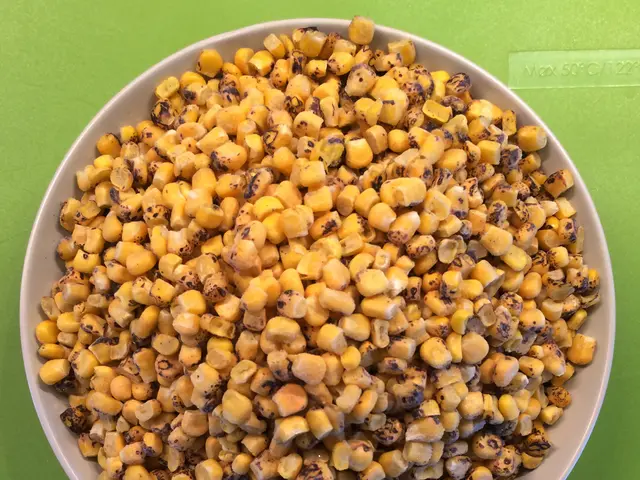Gimme the Lowdown on Dill, Will ya?
Discover the Culinary Classification: Herb or Vegetable - A Deep Dive into Dill
You've probably encountered dill in various meals, but have you ever pondered the question, "Is dill an herb or a veggie?" Well buckle up, because we're about to settle this debate once and for all!
Though dill may seem like a vegetable due to its similar family roots with celery, it's generally categorized as an herb. Its popularity shines through in European and Asian cuisines. Knowing its culinary uses is one thing, but did you know that dill has been used to treat digestive issues, bad breath, and colic in infants?
Dill goes by the name "dill weed," and it has slender stems and soft leaves with a sweet, grassy taste. If you dig deeper into the flavors, you'll find the seeds have a more aromatic flavor. The citrusy flavor of both the leaves and seeds make dill a must-have condiment for dishes like salad dressing and various foods.
Want to know more about this fascinating herb? Keep on reading as we dive deep into dill's intriguing origins, characteristics, growing methods, and tips for storing it. We've also got guides to growing dill and harvesting dill to help spice up your garden.
Dill: A Brief History
Dill is an annual herb that falls under the Apiaceae family, like celery. You can find it widely grown across Eurasia, with names like Sathakuppai in Tamil and Suva Bhaji in Hindi. The word "dill" pops up in many Germanic languages, but its exact origin remains a mystery.
It's believed "dill" is derived from the Old Norse word "Dylla," meaning "to soothe." For millennia, dill has played a significant role in the medical practices of ancient Egyptians, Greeks, and Romans. You might even spot dill in the tomb of Amenhotep II, an Egyptian Pharaoh, dating back to approximately 1400 B.C.
Dill plants are tall, growing between 8 to 30 inches, and have fern-like leaves and yellow flowers. They have a strong flavor and a dark sea-green color. When it comes to using dill, options abound. The citrusy flavor of leaves and seeds make it a perfect condiment for dressings, sauces, and dishes like salmon, chicken, and potatoes.
Tips for Cultivating and Storing Dill
Fancy having fresh dill on hand whenever you desire? Then it's time to get your green thumb on! Dill is a fantastic addition to any kitchen garden, both indoors and out. With the right care, it's relatively easy to grow and thrive in most environments.
Follow these steps to grow dill, and your herb garden will reap plenty of benefits:
- First, choose the location for your dill. It prefers full sunlight.
- Prepare the soil by adding compost or other organic matter.
- Sow the seeds directly into the soil, as they don't require a lot of cultivation.
- Water the seeds daily until they sprout.
- Once the plants are established, water them regularly but sparingly to avoid waterlogged soil.
Once you've harvested dill, it's crucial to store it properly to maintain its freshness. Here are some methods for storing dill:
- Fresh method: wash, pat dry, and place in a zip-top plastic bag. Store in the refrigerator and use within a few days.
- Freezing method: wrap in cellophane or place in a freezer-safe plastic bag. Freeze up to a year.
- Drying method: dry the dill and store it in an airtight glass container in a cool, dry place. Use the dried dill within a year. Dried dill doesn't retain the same flavor as fresh, so you'll need to use more in recipes.
Culinary Adventures with Dill
With a strong, aromatic fragrance and its citrusy taste, dill is a fantastic way to add flavor to dishes. The possibilities are endless:
- Toss fresh dill sprigs into green salads.
- Garnish soups and roasted vegetable dishes.
- Chop the dill and use as a staple in salads.
- Add it to baked bread.
- Sprinkle it on egg, fish, or lamb recipes.
Reach new heights in your cooking adventures with these dill-inspired recipes:- Dilled Brussels sprouts- Vegetable dill stew- Herbed dill dressing
The Many Perks of Dill
Dill packs a mighty punch when it comes to nutritional value. Vitamins A, C, D, iron, copper, manganese, zinc, potassium, and dietary fiber are just a few of the goodies you'll find within dill sprigs. Enjoy these benefits when you consume dill:
- Antioxidants help protect our cells against free radicals.
- Vitamin A supports healthy vision and boosts immune functionality.
- Dill aids in proper digestion.
- It helps prevent sleep problems.
- Dill may help combat respiratory infections.
- Anticancer and heart benefits make dill a worthwhile addition to your diet.
- It contributes to bone health.
In addition to these health benefits, dill plays a role in the treatment of Type 2 diabetes. It can also assist in preventing diabetes from occurring in the first place as part of a balanced diet.
In conclusion, dill is a vibrant addition to your diet, infusing your culinary creations with flavor while providing numerous health benefits. Unleash your inner chef and explore the wide range of possibilities dill has to offer!
- Dill, a member of the Apiaceae family, is an annual herb that has a long history of cultivation across Eurasia, known as Sathakuppai in Tamil and Suva Bhaji in Hindi.
- Its name, "dill," is thought to stem from the Old Norse word "Dylla," meaning "to soothe," and has been used for millennia in the medical practices of ancient Egyptians, Greeks, and Romans.
- Dill plants exhibit a strong flavor and deep sea-green color, with tall growth of 8 to 30 inches and fern-like leaves, yielding both edible leaves, known as dill weed, and aromatic seeds.
- The citrusy taste of dill leaves and seeds makes it a versatile herb in European and Asian cuisines, acting as a perfect condiment for salads, sauces, and various dishes like salmon, chicken, and potatoes.
- For those wanting to cultivate dill, it can be easily grown by choosing a sunny location, preparing the soil with compost, and sowing seeds directly into the soil, ensuring a bountiful garden addition.
- To maintain freshness, dill can be stored by washing, patting dry, and placing in a zip-top plastic bag in the refrigerator, or frozen for up to a year in cellophane or a freezer-safe plastic bag.
- Dill can be incorporated into diverse culinary creations, such as dilled Brussels sprouts, vegetable dill stew, and herbed dill dressing, while offering numerous health benefits, like providing antioxidants, supporting healthy vision and boosting immune functionality, as well as aiding in digestion, preventing sleep problems, combating respiratory infections, and reducing the risk of developing Type 2 diabetes.








